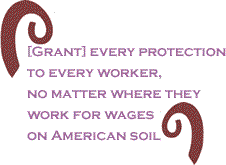
|
|||||||||||||||||||||||

Custom Search
|
|
 |
|
With all the hoop-la over “Joe the
Plumber” and what will or will not happen if Barack Obama’s tax
plan or John McCain’s tax plan goes into effect, it’s easy to forget
some of the most neglected, abused, and exploited workers in For more than 70 years, those whose back-breaking labor brings the food to tables across the nation have been left out of the mainstream of rights for workers under the labor laws of the 1930s. There are other workers who suffer the same fate, as well, but probably no others have suffered in the way that farm workers have. They have a minimum wage, but it’s below the standard wage for industrial and other workers, and has been since there’s been a minimum wage. They don’t have a right to overtime and they’re not covered by the federal law that gave most workers the right to organize unions and collectively bargain over wages, benefits, and working conditions. This was the result of a deal between the administration
of President Franklin D. Roosevelt and powerful corporate interests,
which even then controlled the majority of food produced in FDR did not want to endanger the agreement to allow industrial workers, and workers in general, from the right to organize unions, collectively bargain, and to work under standards that were fair - so, he agreed to leave out the most vulnerable, believing that they could be included in the near future.
For those workers, every day has been a struggle and every day has been filled with sweated labor. They are not paid for travel to work (often by contractors who take them long distances by bus or van) and they are not paid for down time. Their day can start as early as 4 a.m. and last until they get back home at 8:30 p.m. States where there are significant numbers of farm
workers who work in much the same conditions include Conditions for those workers are sometimes a little better than the migrant workers who are usually Latino or black, but they still are not covered by America’s labor laws and the minimal protections those laws afford. But, back to “Joe the Plumber” and the politicians’ great concern for him. The big discussion on the campaign trail was whether he would be taxed more by Senator Obama or Senator McCain. Where Joe comes from, the average plumber would be making somewhere around $49,000 a year and McCain was worried that Obama’s tax plan would tax Joe more as he bought the business he worked for and his income rose to $250,000. The reality for farm workers is that, to achieve an annual income of even $40,000 a year, their family of four would have to nearly double their efforts and that’s just about impossible, because of their working conditions and the recruiting process by labor contractors or the employers, themselves. And, the reality for farm workers is that no one
is talking about their working and living conditions as a campaign
issue - but, then, they don’t vote much. A case in point for growers who do pay is the situation
of workers in the tomato fields of Generally speaking, that is not humanly possible. When they finally get to the workplace each day, they begin picking as fast as they can to maximize their income. A quick comparison: In the supermarket, a ripe-looking red tomato might cost $1.99 a pound. That would be $63.68 for the 32-pound bucket for which the worker received 45 cents.
The real cost of the food should be the difference between what those costs are now and what they would be if farm workers were paid a living wage, and received benefits and a pension. The way to do that is to face up to the bullies of the economic system who have stood astride (or on) the workers for seven decades, and to change the labor law to include all workers, granting every protection to every worker, no matter where they work for wages on American soil.
BlackCommentator.com Columnis,t John Funiciello, is a labor organizer and former union
organizer. His union work started when he became a local president
of The Newspaper Guild in the early 1970s. He was a reporter for
14 years for newspapers in |
|
Any BlackCommentator.com article may be re-printed so long as it is re-printed in its entirety and full credit given to the author and www.BlackCommentator.com. If the re-print is on the Internet we additionally request a link back to the original piece on our Website. Your comments are always welcome. eMail re-print notice
If you send us an eMail message we may publish all or part of it, unless you tell us it is not for publication. You may also request that we withhold your name. Thank you very much for your readership. |
|
| |
|
| October 23, 2008 Issue 296 |
|
| Executive Editor: Bill Fletcher, Jr. |
| Managing Editor: Nancy Littlefield |
| Publisher: Peter Gamble |
| Est. April 5, 2002 |
Printer Friendly Version
in resizeable plain
text format or pdf
format. |
| Frequently Asked Questions |
 |

|
 |
 |
 |
| |
| |































 That
near future never came and farm workers have been at the bottom
of the pay scale and the standard of living ever since. Some states
have passed legislation to allow farm workers to organize and stand
up for their rights, notably
That
near future never came and farm workers have been at the bottom
of the pay scale and the standard of living ever since. Some states
have passed legislation to allow farm workers to organize and stand
up for their rights, notably 
 While
it’s true that systems like the American food system are complex
and contain all kinds of hidden costs, it’s pretty clear that there
is a great load of profit involved, especially if labor costs are
minimized. It’s what is called
While
it’s true that systems like the American food system are complex
and contain all kinds of hidden costs, it’s pretty clear that there
is a great load of profit involved, especially if labor costs are
minimized. It’s what is called 




